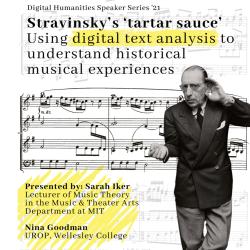PRESENTED BY: Sarah Iker
Lecturer of Music Theory in the Music & Theater Arts Department at MIT
& Nina Goodman, UROP at Wellesley College
ABSTRACT: When the ballet Pulcinella premiered in Paris in 1920, reviewers registered surprise at its conventional musical style. After the 1913 Rite of Spring, Igor Stravinsky’s move toward writing music that mimicked eighteenth-century styles felt retrogressive and reactionary. One intrepid reviewer described the new ballet as “Pergolesi’s music, flavored by Stravinsky’s tartar sauce.” This experience, while not entirely unfamiliar to present-day listeners, suggests that there is something to be recovered, an essence of “what it was like” to experience Stravinsky’s neoclassical music between the World Wars. In this talk, I explore using digital text analysis to better understand these historical experiences in their own words, concluding with a look at how these computational tools can lead toward very different approaches to analyzing neoclassical music in general.
BIO: Sarah Iker is a Lecturer of Music Theory in the Music & Theater Arts Department at MIT. She holds a Ph.D. in Music History and Theory from the University of Chicago. Her research explores the historical reception and perception of Igor Stravinsky’s neoclassical music, written between 1920 and 1950. Her work uses digital humanities techniques to analyze contemporaneous description of Stravinsky’s music to inform modern analytical approaches and reanimate older ways of perceiving the music. She has presented her research at regional, national, and international conferences, including the national meeting of the Society for Music Theory.
NOTE: After registering, you will receive a confirmation email containing information about joining the meeting.

